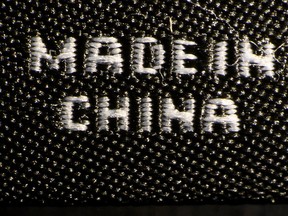The truth is neither country is critical to each other
Article content
The Canadian government’s recent acknowledgment that it’s weighing economic considerations in its tit-for-tat feud with China over foreign interference has evoked an array of reactions.
Advertisement 2
Article content
Some saw it as an unprincipled concern that cheapens the seriousness of the matter. Others feel Prime Minister Justin Trudeau is right to proceed with caution to mitigate any economic fallout.
Article content
Less contested in the debate is an underlying assumption that China has most of the economic leverage and Canada the most to lose in any trade fight. But those fears may be overstated.
One of the most striking things about Canada’s economic ties with China is how disappointing the results have been, at least relative to expectations and the amount of political oxygen the relationship has taken up in Ottawa. Canadians buy a lot of stuff from China, but our businesses have struggled to benefit and there’s little cross-border investment.
Article content
Advertisement 3
Article content
The truth is neither country is critical to each other.
Canadian merchandise exports to the Asian country represent just four per cent of our total shipments abroad, a share that has changed little over the past decade. In comparison, China accounts for more than seven per cent of the U.S.’s total exports.
Canada barely even registers as a market for Chinese exporters – representing not much more than one per cent of their shipments abroad. It’s one reason why many Canadians worry we are so easily dismissible.
But in absolute terms, there’s no denying the Chinese have gotten the better of the trading relationship.
Over the past 12 months alone, Canada imported about $70 billion worth of goods from China, which was double our exports to the country. Over the past decade, China has run trade surpluses with Canada totalling more than $200 billion. Even if the relationship isn’t a core one, why would the Chinese government forfeit such an advantage?
Advertisement 4
Article content
The investment picture, too, has been anemic.
Chinese foreign direct investment into Canada has totalled a net $16 billion since 2012, which is just 2.6 per cent of total inflows. And it’s going in the wrong direction, with Chinese investors pulling out $2 billion over the past two years.
Canadian direct investment into China has totalled just $14 billion over the past decade, 1.5 per cent of Canada’s total investment abroad. For comparison, Canadian businesses last year alone invested $53 billion in the United States.
Of course, there will be costs if the economic relationship deteriorates dramatically.
Asset managers, some financial institutions and the nation’s pension funds have been active in China and are exposed.
Advertisement 5
Article content
Some resource-based companies in the forestry and fertilizer sectors are vulnerable. Canola has been a favourite target for retaliation in the past by the Chinese government. Regionally, British Columbia has the most to lose given its proximity.
Clearly, officials shouldn’t be nonchalant about the consequences, and the government is right to be careful.
There’s no question that trade frictions drive up the price of things for both consumers and businesses and can be extremely disruptive to exporters and importers.
But this applies to China as well. There’s no reason why Canada must shy away from economic brinkmanship if needed, particularly if a more adversarial relationship becomes the norm.
The federal government has spent the past six months bracing Canadians for exactly such a pivot. Finance Minister Chrystia Freeland has been warning that global supply chains are reconfiguring toward what she calls friendshoring, where Canada’s close allies forge deeper ties among themselves and reduce reliance on autocracies such as China and Russia.
Advertisement 6
Article content
The end result may be little change for Canada.
More than three-quarters of our total trade last year was with other G7 countries, versus just 30 per cent for the United States.
-

Climate plan doubts could speed up Canada election timing
-

PSAC workers’ fight with inflation was already lost
-

Why economists are raising alarms around immigration
Friendshoring is already a reality for us and the reason is obvious. We’ve long been doing most of our trade with one partner — the Americans.
It’s a dependence that has been seen both as a strength and vulnerability given the recurring bouts of protectionism south of the border.
China’s vast market was seen as an opportunity to break that reliance. Former prime minister Stephen Harper saw warmer relations with China as a way to diversify markets for resource exports. Trudeau was enamoured by the potential for electronic commerce to open up the Chinese market to Canadian small and medium-sized businesses.
That promise is quickly fading. However, being economically fettered to the world’s largest economy is not a terrible consolation prize.
Theo Argitis is managing partner at Compass Rose Group.
Why Canada has leverage as China relations sour
2023-05-15 17:11:34







Comments
Postmedia is committed to maintaining a lively but civil forum for discussion and encourage all readers to share their views on our articles. Comments may take up to an hour for moderation before appearing on the site. We ask you to keep your comments relevant and respectful. We have enabled email notifications—you will now receive an email if you receive a reply to your comment, there is an update to a comment thread you follow or if a user you follow comments. Visit our Community Guidelines for more information and details on how to adjust your email settings.
Join the Conversation